国际学术会议常用语英语
最新国际学术会议常用语(英语)
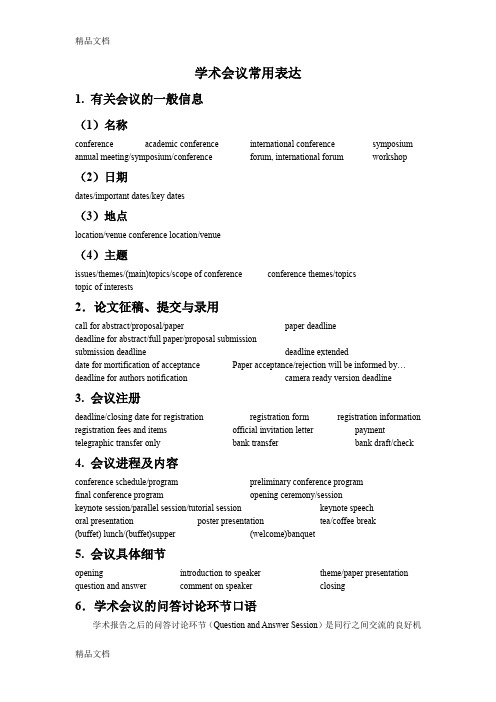
学术会议常用表达1. 有关会议的一般信息(1)名称conference academic conference international conference symposium annual meeting/symposium/conference forum, international forum workshop(2)日期dates/important dates/key dates(3)地点location/venue conference location/venue(4)主题issues/themes/(main)topics/scope of conference conference themes/topicstopic of interests2.论文征稿、提交与录用call for abstract/proposal/paper paper deadlinedeadline for abstract/full paper/proposal submissionsubmission deadline deadline extendeddate for mortification of acceptance Paper acceptance/rejection will be informed by…deadline for authors notification camera ready version deadline3. 会议注册deadline/closing date for registration registration form registration information registration fees and items official invitation letter payment telegraphic transfer only bank transfer bank draft/check4. 会议进程及内容conference schedule/program preliminary conference programfinal conference program opening ceremony/sessionkeynote session/parallel session/tutorial session keynote speechoral presentation poster presentation tea/coffee break (buffet) lunch/(buffet)supper (welcome)banquet5. 会议具体细节opening introduction to speaker theme/paper presentation question and answer comment on speaker closing6.学术会议的问答讨论环节口语学术报告之后的问答讨论环节(Question and Answer Session)是同行之间交流的良好机会,双方可以针对报告中的具体问题进行探讨(1)答问的方式与技巧回答讨论环节可以让报告人通过互动及时地获得信息反馈并可以把在讨论中或得的建设性建议用于下一步的工作,因此对科研工作有很大的促进作用。
国际学术会议常用语(英语)

学术会议常用表达1. 有关会议的一般信息(1)名称conference academic conference international conference symposium annual meeting/symposium/conference forum, international forum workshop(2)日期dates/important dates/key dates(3)地点location/venue conference location/venue(4)主题issues/themes/(main)topics/scope of conference conference themes/topicstopic of interests2.论文征稿、提交与录用call for abstract/proposal/paper paper deadlinedeadline for abstract/full paper/proposal submissionsubmission deadline deadline extendeddate for mortification of acceptance Paper acceptance/rejection will be informed by…deadline for authors notification camera ready version deadline3. 会议注册deadline/closing date for registration registration form registration information registration fees and items official invitation letter payment telegraphic transfer only bank transfer bank draft/check4. 会议进程及内容conference schedule/program preliminary conference programfinal conference program opening ceremony/sessionkeynote session/parallel session/tutorial session keynote speechoral presentation poster presentation tea/coffee break (buffet) lunch/(buffet)supper(welcome)banquet5. 会议具体细节opening introduction to speaker theme/paper presentation question and answer comment on speaker closing6.学术会议的问答讨论环节口语学术报告之后的问答讨论环节(Question and Answer Session)是同行之间交流的良好机会,双方可以针对报告中的具体问题进行探讨(1)答问的方式与技巧回答讨论环节可以让报告人通过互动及时地获得信息反馈并可以把在讨论中或得的建设性建议用于下一步的工作,因此对科研工作有很大的促进作用。
国际学术交流英语单词词汇
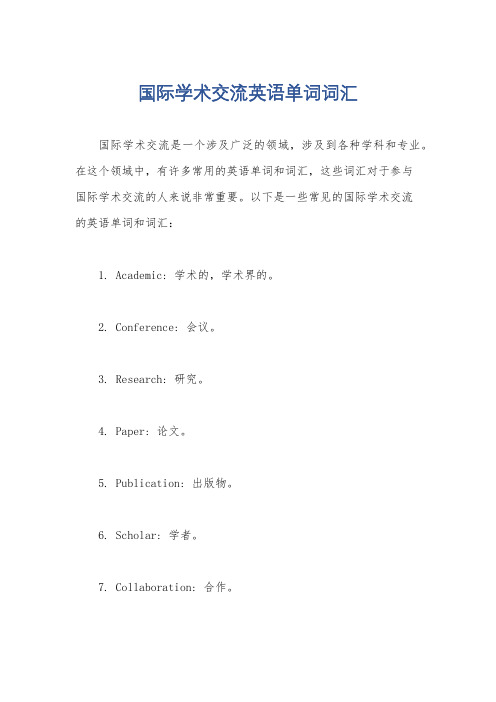
国际学术交流英语单词词汇国际学术交流是一个涉及广泛的领域,涉及到各种学科和专业。
在这个领域中,有许多常用的英语单词和词汇,这些词汇对于参与国际学术交流的人来说非常重要。
以下是一些常见的国际学术交流的英语单词和词汇:1. Academic: 学术的,学术界的。
2. Conference: 会议。
3. Research: 研究。
4. Paper: 论文。
5. Publication: 出版物。
6. Scholar: 学者。
7. Collaboration: 合作。
8. Presentation: 演讲,展示。
9. Abstract: 摘要。
10. Peer review: 同行评议。
11. Citation: 引用。
12. Thesis: 论文,论题。
13. Dissertation: 学位论文。
14. Plagiarism: 抄袭。
15. Academic integrity: 学术诚信。
16. Grant: 资助金,补助金。
17. Symposium: 座谈会,研讨会。
18. Panel: 小组讨论。
19. Academic journal: 学术期刊。
20. Academic writing: 学术写作。
这些词汇涵盖了国际学术交流中的各个方面,包括会议、研究、出版、合作等。
在国际学术交流中,熟悉并正确运用这些词汇是非常重要的,可以帮助人们更好地参与到国际学术交流中去。
同时,这些词汇也反映了国际学术交流的复杂性和多样性,需要人们具备丰富的词汇量和专业知识才能更好地融入这个领域。
希望以上信息对你有所帮助。
国际学术会议英语课后习题

国际学术会议英语课后习题TMD是由英文的“国际学术会议”缩写而来。
英文的“国际学术会议”缩写是由美国著名的数学家托马斯·杰斐逊于1909年在芝加哥召开的第一次国际学术会议上提出的。
由于杰斐逊的提议,世界上第一个被选为国际学术会议的学者是英国的牛顿教授。
自此以后每年举办一次国际学术会议——国际科学会议。
这个会议每年在美国纽约召开一次。
第一届国际科研会议于1909年在旧金山召开。
第二届会议于1910年在美国芝加哥召开,第二届会议在1911年在英国伦敦召开。
TMD英文缩写的英文名称分别为 Supervisor、 Isociates和 Chemical Study。
1.国际科学会议一般分为()个学术性的分会场(Supervisor)和()个技术性的分会场(Isociates)。
它有学术性、综合性的四种形式,其中学术性分会场又分为许多分会场。
目前国际科学会议主要是集中在美国纽约召开的,这是其分会场比较集中的地方。
其他分会场有:欧洲学术年会和俄罗斯学术讨论会。
在日本举办的国际生物与分子生物讨论会。
;在韩国举办了国际生物科学大会,该会议是韩国国立大学举办的学术交流活动;新加坡以会议为中心,开设了各种学术论坛。
各分会场主要有:美国纽约、日本东京、中国上海等地举行的各种会议,包括美国科学院国际大会、科学技术部国际大会和欧洲及亚洲国家地区大学代表大会等会议。
而其他地区性机构组织或个人利用其在当地及本组织的科研技术、知识或人力资源优势举办的各类比赛和展览活动很多。
以上是有关“中国-香港-澳门”世界四大科学会议之一—— TMD (Temporary and Development in China Asia Dog Decision.)的说明。
请结合材料理解,并对照练习,找出正确答案及解析。
2.各分会场的议程内容不相同。
在每一次会议的议程上,分会场都要准备一份报告。
报告的主题由大会主持人向大会主席汇报后提交至主论坛的主持人处。
国际学术会议常用语(英语)
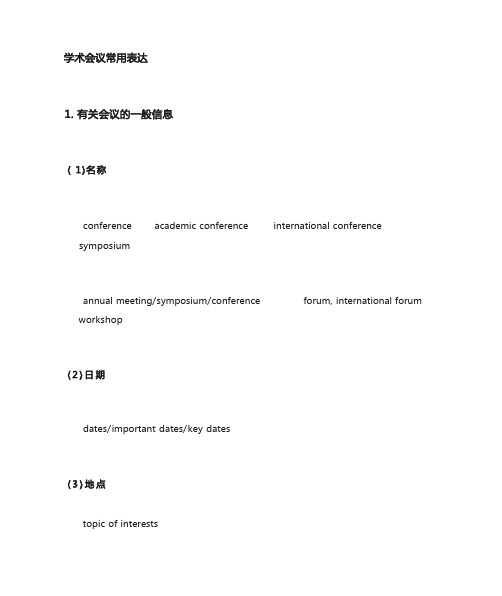
conference academic conference international conference symposiumannual meeting/symposium/conference forum, international forum workshopdates/important dates/key datestopic of interestslocation/venue conference location/venueissues/themes/(main)topics/scope of conferenceconference themes/topicstopic of interestscall for abstract/proposal/paper paper deadline deadline for abstract/full paper/proposal submissionsubmission deadlinedate for mortification of acceptanceinformed by…deadline for authors notificationdeadlinedeadline/closing date forregistration registration informationregistration fees and itemstelegraphic transfer onlydraft/checkdeadline extendedPaper acceptance/rejection will becamera ready version registration formofficial invitation letter bank transferpaymentbankconference schedule/program preliminary conference programfinal conference program opening ceremony/sessionkeynote session/parallel session/tutorial session keynote speechoral presentation poster presentation tea/coffee break(buffet) lunch/(buffet)supper (welcome)banquetopening introduction to speaker theme/paper presentationquestion and answer comment on speaker closing学术报告之后的问答讨论环节( Question and Answer Session )是同行之间交流的良好机会,双方可以针对报告中的具体问题进行探讨回答讨论环节可以让报告人通过互动及时地获得信息反馈并可以把在讨论中或得的建设性建议用于下一步的工作,因此对科研工作有很大的促进作用。
国际学术会议常用语英语

国际学术会议常用语英语This model paper was revised by LINDA on December 15, 2012.学术会议常用表达1. 有关会议的一般信息(1)名称conference academic conference international conference symposiumannual meeting/symposium/conference forum, international forum workshop(2)日期dates/important dates/key dates(3)地点location/venue conference location/venue(4)主题issues/themes/(main)topics/scope of conference conference themes/topics topic of interests2.论文征稿、提交与录用call for abstract/proposal/paper paper deadlinedeadline for abstract/full paper/proposal submissionsubmission deadline deadline extendeddate for mortification of acceptance Paper acceptance/rejectionwill be informed by…deadline for authors notification camera ready version deadline3. 会议注册deadline/closing date for registration registration form registration informationregistration fees and items official invitation letter paymenttelegraphic transfer only bank transferbank draft/check4. 会议进程及内容conference schedule/program preliminary conference programfinal conference program opening ceremony/session keynote session/parallel session/tutorial sessionkeynote speechoral presentation poster presentationtea/coffee break(buffet) lunch/(buffet)supper (welcome)banquet5. 会议具体细节opening introduction to speakertheme/paper presentationquestion and answer comment on speakerclosing6.学术会议的问答讨论环节口语学术报告之后的问答讨论环节(Question and Answer Session)是同行之间交流的良好机会,双方可以针对报告中的具体问题进行探讨(1)答问的方式与技巧回答讨论环节可以让报告人通过互动及时地获得信息反馈并可以把在讨论中或得的建设性建议用于下一步的工作,因此对科研工作有很大的促进作用。
国际学术会议常用语(英语)
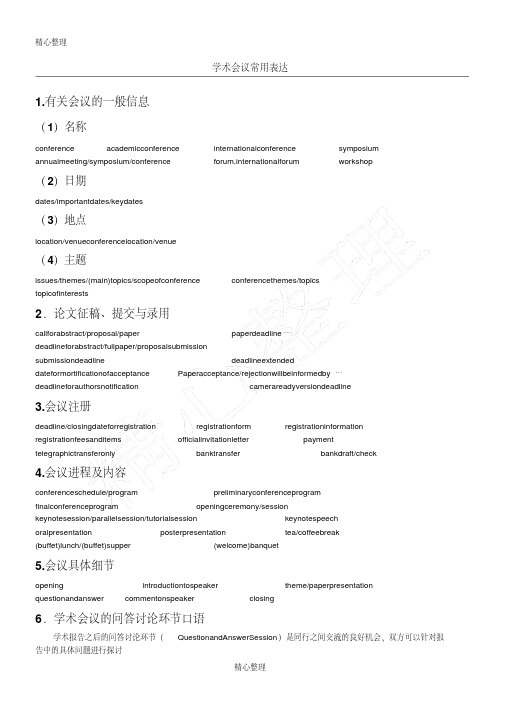
④问题的类型
对于寻求具体解释的一些问题, 可以简单地重复报告的内容来对问题进行说明或证明,
或是澄清听众的误解。 如
果提问者对报告内容提出不同见解,可以通过资料、事实、数据等来证明自己的观点,但一定注意态度要礼貌谦
和。 对于过于复杂的深层问题无法进行简单回答时, 可以在简略回答之后邀约提问者在其他时间进行讨论。
准备作为准备工作的一部分,进行深入考虑,全面的预测听众可能提出的问题,可以假设一些问题,并准备好最
合适的解答。如果会议没有统一安排每个报告的问答环节,报告者在进行报告时就要预先告知听众随后的
Q&
ASession,这样可以让听众为提问做好准备。
②过程控制
在时间允许的情况下尽可能让每个想提问的人都有机会提问,
③答问方式
应首先仔细听清问题, 在回答之前应将问题清楚的重复一遍, 这可以保证对问题的正确理解, 确保每个人都能听 清楚问题,同时给自己一些时间来思考,表述答案前可做片刻停留,这既引起了听众的注意,又表明了对答案的 谨慎态度, 同时也给自己留更多的思考空间。 不要对问题进行评价, 避免说类似 “ Thatwasagreatquestion”的话, 如果想要对某一问题进行肯定,可以用“ Thanksforaskingthatquestion ”或“ Igetaskedthatquestionbymanypeople. ” 等中性的表述,还可以让听众感到平等。回答问题时应尽可能简洁,切题。在回答中应尽可能多地提及报告中的 内容,这有利于听众对报告内容加深印象,并有利于控制问答环节的主题。
精心整理
学术会议常用表达
1.有关会议的一般信息
( 1)名称
conference
academicconference
学术英语中的重要词汇梳理
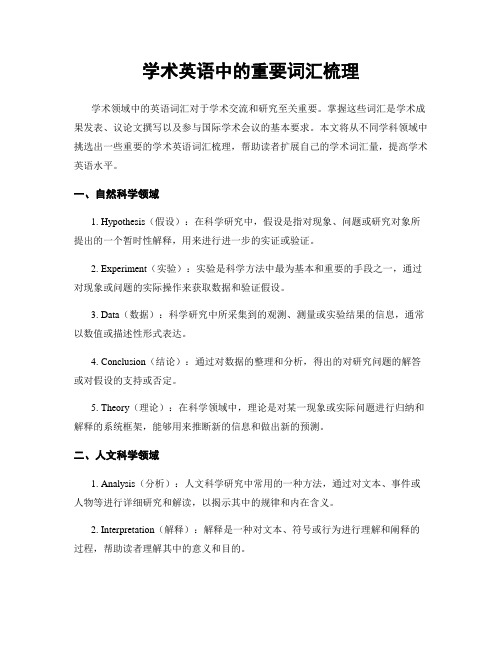
学术英语中的重要词汇梳理学术领域中的英语词汇对于学术交流和研究至关重要。
掌握这些词汇是学术成果发表、议论文撰写以及参与国际学术会议的基本要求。
本文将从不同学科领域中挑选出一些重要的学术英语词汇梳理,帮助读者扩展自己的学术词汇量,提高学术英语水平。
一、自然科学领域1. Hypothesis(假设):在科学研究中,假设是指对现象、问题或研究对象所提出的一个暂时性解释,用来进行进一步的实证或验证。
2. Experiment(实验):实验是科学方法中最为基本和重要的手段之一,通过对现象或问题的实际操作来获取数据和验证假设。
3. Data(数据):科学研究中所采集到的观测、测量或实验结果的信息,通常以数值或描述性形式表达。
4. Conclusion(结论):通过对数据的整理和分析,得出的对研究问题的解答或对假设的支持或否定。
5. Theory(理论):在科学领域中,理论是对某一现象或实际问题进行归纳和解释的系统框架,能够用来推断新的信息和做出新的预测。
二、人文科学领域1. Analysis(分析):人文科学研究中常用的一种方法,通过对文本、事件或人物等进行详细研究和解读,以揭示其中的规律和内在含义。
2. Interpretation(解释):解释是一种对文本、符号或行为进行理解和阐释的过程,帮助读者理解其中的意义和目的。
3. Literature review(文献综述):在人文科学领域的研究中,文献综述是一种对相关研究文献进行搜集、整理和分析的方法,以获得对研究问题或主题的全面认识。
4. Critique(批评):在学术论述中,批评是对某个观点、理论或研究进行评价和评估的过程,包括识别其优点和缺点,并提出改进或替代建议。
5. Methodology(方法论):研究方法和方法论是人文科学研究中不可或缺的部分,指导研究者在进行研究时选择适当的研究方法和方式。
三、社会科学领域1. Survey(调查):社会科学研究中常用的一种数据收集和分析方法,通过问卷、面谈或观察等方式收集大量数据,了解社会现象和人们的行为。
表达场景的英语单词
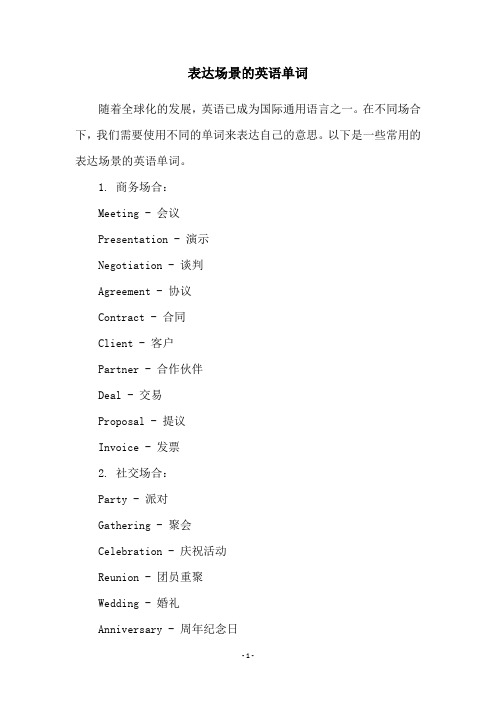
表达场景的英语单词随着全球化的发展,英语已成为国际通用语言之一。
在不同场合下,我们需要使用不同的单词来表达自己的意思。
以下是一些常用的表达场景的英语单词。
1. 商务场合:Meeting - 会议Presentation - 演示Negotiation - 谈判Agreement - 协议Contract - 合同Client - 客户Partner - 合作伙伴Deal - 交易Proposal - 提议Invoice - 发票2. 社交场合:Party - 派对Gathering - 聚会Celebration - 庆祝活动Reunion - 团员重聚Wedding - 婚礼Anniversary - 周年纪念日Concert - 音乐会Exhibition - 展览会 Theater - 剧院Movie - 电影3. 学术场合:Lecture - 讲座Seminar - 研讨会Conference - 会议 Symposium - 座谈会 Thesis - 论文Research - 研究Experiment - 实验 Publication - 发表 4. 日常生活场合: Shopping - 购物Dining - 就餐Travel - 旅行Sports - 运动Exercise - 锻炼Hobby - 爱好Gardening - 园艺Pet - 宠物Volunteer - 志愿者5. 紧急场合:Emergency - 紧急情况Accident - 事故Fire - 火灾Robbery - 抢劫Injury - 受伤Hospital - 医院Police - 警方Ambulance - 救护车Rescue - 援救以上是一些常用的表达场景的英语单词,希望对大家有所帮助。
国际学术会议常用语(英语)
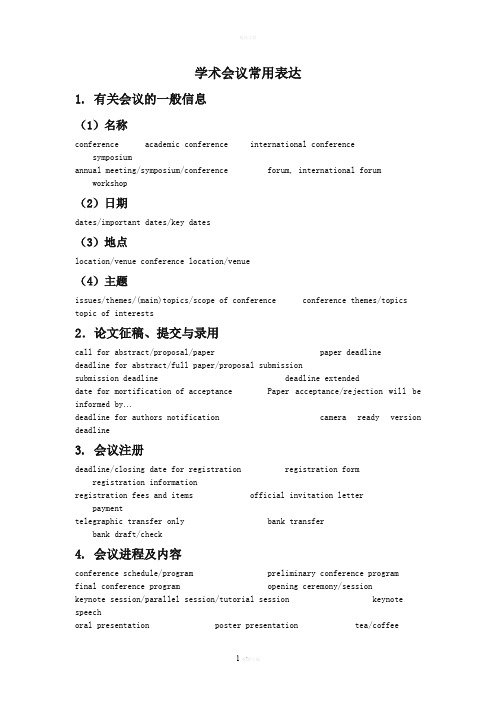
学术会议常用表达1. 有关会议的一般信息(1)名称conference academic conference international conference symposiumannual meeting/symposium/conference forum, international forum workshop(2)日期dates/important dates/key dates(3)地点location/venue conference location/venue(4)主题issues/themes/(main)topics/scope of conference conference themes/topics topic of interests2.论文征稿、提交与录用call for abstract/proposal/paper paper deadlinedeadline for abstract/full paper/proposal submissionsubmission deadline deadline extendeddate for mortification of acceptance Paper acceptance/rejection will be informed by…deadline for authors notification camera ready version deadline3. 会议注册deadline/closing date for registration registration form registration informationregistration fees and items official invitation letter paymenttelegraphic transfer only bank transferbank draft/check4. 会议进程及内容conference schedule/program preliminary conference programfinal conference program opening ceremony/sessionkeynote session/parallel session/tutorial session keynote speechoral presentation poster presentation tea/coffeebreak(buffet) lunch/(buffet)supper (welcome)banquet5. 会议具体细节opening introduction to speaker theme/paper presentationquestion and answer comment on speaker closing6.学术会议的问答讨论环节口语学术报告之后的问答讨论环节(Question and Answer Session)是同行之间交流的良好机会,双方可以针对报告中的具体问题进行探讨(1)答问的方式与技巧回答讨论环节可以让报告人通过互动及时地获得信息反馈并可以把在讨论中或得的建设性建议用于下一步的工作,因此对科研工作有很大的促进作用。
国际学术会议(International Academic Conference)介绍

Forum
Congress
Convention
Conference
The definition of IAC
3.Purpose
grasp the latest developments in international academic field
promote the development of teaching- research related disciplines
Tour and sightseeing
Banquet
The process of IAC
1.Agenda of conference Opening session
Welcoming remark
Keynote speech
Plenary session
Parallel session
Poster session
First, I would like to reflect upon...Second, I will attempt to highlight …Third, I shall explore a possible agenda ... By the end of this presentation you will know all there is to know about...Thank you for your listening.
→ the submission of paper → important deadlines
The organization of IAC
3.Conference program and logistics
a guide & a plan to the participants activities at a definite time and place
国际学术会议英语入门共49页

56、极端的法规,就是极端的不公。 ——西 塞罗 57、法律一旦成为人们的需要,人们 就不再 配享受 自由了 。—— 毕达哥 拉斯 58、法律规定的惩罚不是为了私人的 利益, 而是为 了公共 的利益 ;一部 分靠有 害的强 制,一 部分靠 榜样的 效力。 ——格 老秀斯 59、假如没有法律他们会更快乐的话 ,那么 法律作 为一件 无用之 物自己 就会消 灭。— —洛克
60、人民的幸福是至高无个的法。— —西塞 罗
1、最灵繁的人也看不见自己的背脊。——非洲 2、最困难的事情就是认识自己。——希腊 3、有勇气承担命运这才是英雄好汉。——黑塞 4、与肝胆人共事,无字句处读书。——周恩来 5、阅读使人充实,会谈使人敏捷,写作使人精确。——培根
国际会议交流英语一般知识概要
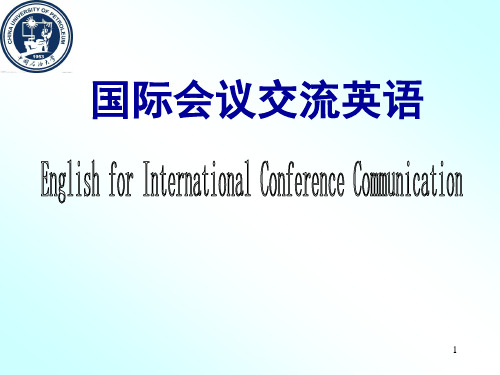
Brief Introduction of Conference
Meeting
Conference
Symposium
Congress
会议
Seminar
Convention
Workshop Colloquium Forum
Forum——论坛,公众会议,讨论大众关心问题的集 会。如Education Forum, Finance Forum
on Polymer Hydrogel
Brief Introduction of Conference
Meeting Symposium
Conference Congress
Convention Colloquium Forum
会议
Seminar
Workshop
Seminar——讨论会,如教授定期与学生讨论他们的报 告和发现、研究生班的专题讨论会。Research Seminar (科 研讨论会)、Teaching Seminar(课堂讨论会)、 Problem Seminar (问题讨论会) 9
国际会议交流英语
1
Brief Introduction of Conference
Meeting Conference Symposium
Congress
会议
Seminar
Convention
Workshop
Colloquium Forum
Meeting——会议,最一般的用词,规模可大可小,层 次可高可低,可以是正式或非正式的聚会,如告别会 议、联席会议、首脑会议、紧急会议等。 2
(1 )This first International Conference on Water and Society aims to provide a multi-disciplinary forum for the presentation and discussion of many issues affecting water resources today.
高一英语学科国际学术会议参与收获与体会练习题50题
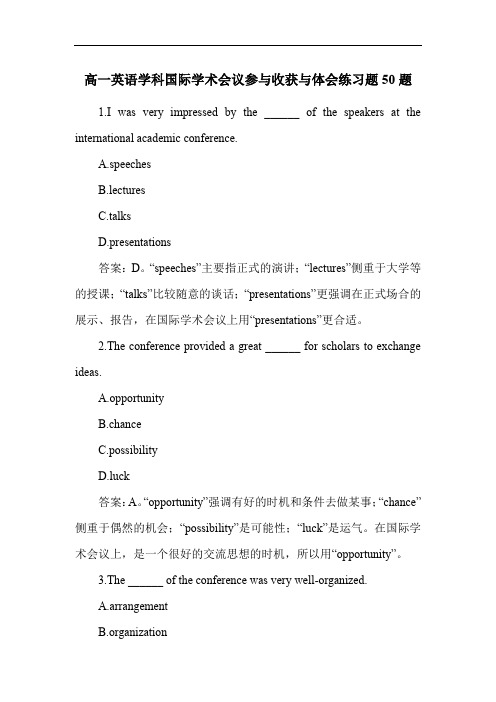
高一英语学科国际学术会议参与收获与体会练习题50题1.I was very impressed by the ______ of the speakers at the international academic conference.A.speechesB.lecturesC.talksD.presentations答案:D。
“speeches”主要指正式的演讲;“lectures”侧重于大学等的授课;“talks”比较随意的谈话;“presentations”更强调在正式场合的展示、报告,在国际学术会议上用“presentations”更合适。
2.The conference provided a great ______ for scholars to exchange ideas.A.opportunityB.chanceC.possibilityD.luck答案:A。
“opportunity”强调有好的时机和条件去做某事;“chance”侧重于偶然的机会;“possibility”是可能性;“luck”是运气。
在国际学术会议上,是一个很好的交流思想的时机,所以用“opportunity”。
3.The ______ of the conference was very well-organized.A.arrangementanizationC.managementD.schedule答案:B。
“arrangement”侧重于具体的安排;“organization”强调组织、机构等,会议的组织良好用“organization”更恰当;“management”是管理;“schedule”是日程安排。
4.The participants had a lot of ______ discussions during the conference.A.energeticB.enthusiasticC.activeD.vigorous答案:C。
国际会议程序中的常用词语
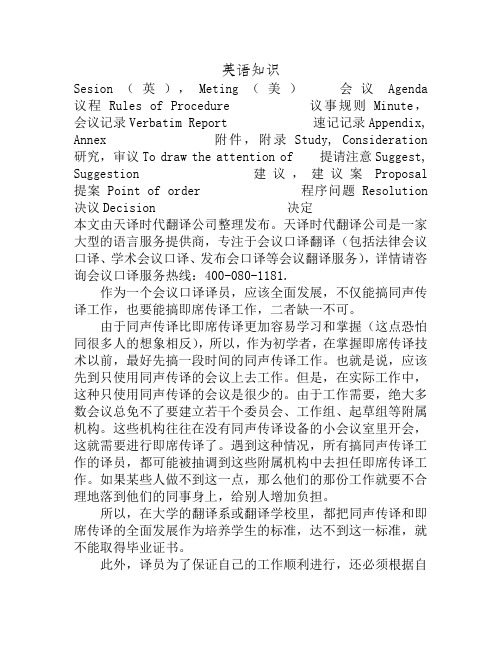
英语知识Sesion(英),Meting(美)会议Agenda 议程Rules of Procedure 议事规则Minute,会议记录Verbatim Report 速记记录Appendix,Annex 附件,附录Study, Consideration研究,审议To draw the attention of 提请注意Suggest, Suggestion 建议,建议案Proposal 提案Point of order 程序问题Resolution 决议Decision 决定本文由天译时代翻译公司整理发布。
天译时代翻译公司是一家大型的语言服务提供商,专注于会议口译翻译(包括法律会议口译、学术会议口译、发布会口译等会议翻译服务),详情请咨询会议口译服务热线:400-080-1181.作为一个会议口译译员,应该全面发展,不仅能搞同声传译工作,也要能搞即席传译工作,二者缺一不可。
由于同声传译比即席传译更加容易学习和掌握(这点恐怕同很多人的想象相反),所以,作为初学者,在掌握即席传译技术以前,最好先搞一段时间的同声传译工作。
也就是说,应该先到只使用同声传译的会议上去工作。
但是,在实际工作中,这种只使用同声传译的会议是很少的。
由于工作需要,绝大多数会议总免不了要建立若干个委员会、工作组、起草组等附属机构。
这些机构往往在没有同声传译设备的小会议室里开会,这就需要进行即席传译了。
遇到这种情况,所有搞同声传译工作的译员,都可能被抽调到这些附属机构中去担任即席传译工作。
如果某些人做不到这一点,那么他们的那份工作就要不合理地落到他们的同事身上,给别人增加负担。
所以,在大学的翻译系或翻译学校里,都把同声传译和即席传译的全面发展作为培养学生的标准,达不到这一标准,就不能取得毕业证书。
此外,译员为了保证自己的工作顺利进行,还必须根据自己的兴趣爱好开展适当的业余活动,如体育运动、娱乐游戏、从事业余研究和写作等。
只有这样,他才能有健康的身体和饱满的精神,以胜任口译这一高度紧张的脑力劳动工作。
国际会议交流英语一般知识概要

国际会议是不同国籍者的会议。
5
Brief Introduction of Conference
Meeting Conference Symposium
Congress
会议
Seminar
Convention
Workshop Colloquium Forum
Meeting——会议,最一般的用词,规模可大可小,层 次可高可低,可以是正式或非正式的聚会,如告别会 议、联席会议、首脑会议、紧急会议等。 6
International Conference on Smart Materials 等
7
Brief Introduction of Conference
Meeting
Conference Symposium
Congress
会议
Seminar
Convention
Workshop
Colloquium
聚众议事
4
Brief Introduction of Conference
一个群体的集会,至少三人,两人的聚会称为“对话”;
必须有主持人,没有人主持的聚会断不能行事;
有一定议事规则,遵循一定规矩,有始有终,发言有
先有后; 有明确的议题,反映共同关心的问题; 有一定的目的,而不是无意识的活动; 有一定的结果; 一种临时性的行为,世界上不存在永无止境的会议。
组织信息 Organizational Information
与会人员信息 会议日程信息 Participants Conference Program Information Information
Abstract:最终期限、长度、格式 participants:与会名额 Agenda:议程 Name Sponsors & Organizers:发起人,主办方 (会议名称) Number of Full Text:最终期限、长度、格式、 for Arrangement of paper presentation:报告安排 Organizing Committee:组委会 attendances:与会资格要求 Date (会议日期) Requirements 影印以及其它一些要求。 Academic Committee:学术委员会 Material distribution:材料发放 Location (会议地点) Conference VIPs (Very Important Persons):特 Model of Presentation:口头报告、 约嘉宾 Secretariat:大会秘书处 Secretarial sections:秘书处办公地点 Topics for Discussion 墙报,报告时间,报告所需条件, Other Members: other facilities: 版权问题等。 Other Committee:如协作单位、赞助单位等 (会议主题)
英语国际会议交流用语资料

英语国际会议交流用语一、开幕式中,宣布开幕、欢迎词及贺词。
(1)Mr President of the Congress, President A and distingu ished guests:尊敬的大会的主席先生,会长A和贵宾们。
(2)Dr. (Professor) A, Dr. (Professor) B, ladies and gen tlemen.A博士(教授)、B博士(教授),女士们,先生们。
(3)Mr. Chairman, fellow delegates, friends. 主席先生、同仁们、朋友们。
2 宣布开会。
(4)I am very pleased and honored to declare(the confer ence)open.我很高兴和荣幸地宣布···开幕。
3 来宾在开幕式上致辞。
(5)I am greatly honored to give the opening address/spe ech at this···(3rd) International Congress of ABC here in Beijin g我深感荣幸在北京举办的第···次ABC国际大会上致开幕词。
4 主办单位对参会者致欢迎词。
(6)On behalf of the ABC society, I am delighted to we lcome all of you to the ···(1st) International Symposium of XYZ.我很高兴代表ABC学会欢迎你们所有的人来参加第···届XYZ国际学术会议。
(7)You have come all the way for this conference. Than k you very much for your attention/participation.你们远道而来参加会议。
国际会议英语口语句
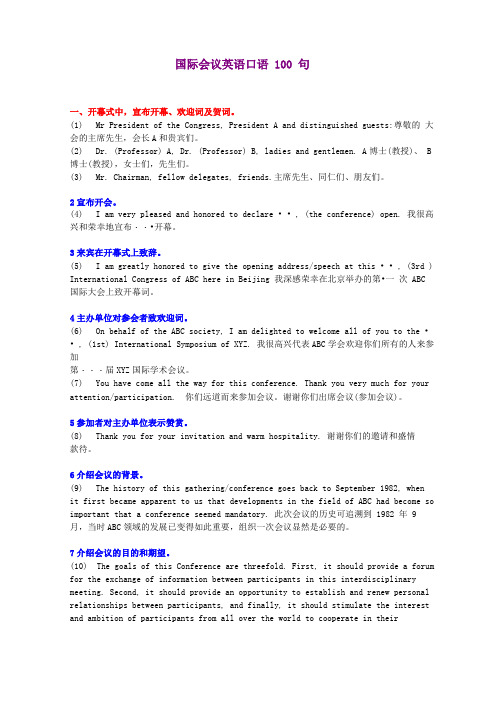
国际会议英语口语 100 句一、开幕式中,宣布开幕、欢迎词及贺词。
(1)Mr President of the Congress, President A and distinguished guests:尊敬的大会的主席先生,会长A和贵宾们。
(2)Dr. (Professor) A, Dr. (Professor) B, ladies and gentlemen. A博士(教授)、 B 博士(教授),女士们,先生们。
(3)Mr. Chairman, fellow delegates, friends.主席先生、同仁们、朋友们。
2宣布开会。
(4)I am very pleased and honored to declare • • , (the conference) open. 我很高兴和荣幸地宣布・・•开幕。
3来宾在开幕式上致辞。
(5)I am greatly honored to give the opening address/speech at this • • , (3rd ) International Congress of ABC here in Beijing 我深感荣幸在北京举办的第•一次 ABC国际大会上致开幕词。
4主办单位对参会者致欢迎词。
(6)On behalf of the ABC society, I am delighted to welcome all of you to the • • , (1st) International Symposium of XYZ.我很高兴代表ABC学会欢迎你们所有的人来参加第・・・届XYZ国际学术会议。
(7)You have come all the way for this conference. Thank you very much for your attention/participation. 你们远道而来参加会议。
- 1、下载文档前请自行甄别文档内容的完整性,平台不提供额外的编辑、内容补充、找答案等附加服务。
- 2、"仅部分预览"的文档,不可在线预览部分如存在完整性等问题,可反馈申请退款(可完整预览的文档不适用该条件!)。
- 3、如文档侵犯您的权益,请联系客服反馈,我们会尽快为您处理(人工客服工作时间:9:00-18:30)。
学术会议常用表达1. 有关会议的一般信息(1)名称conference academic conference international conference symposiumannual meeting/symposium/conference forum, international forum workshop(2)日期dates/important dates/key dates(3)地点location/venue conference location/venue(4)主题issues/themes/(main)topics/scope of conference conference themes/topics topic of interests2.论文征稿、提交与录用call for abstract/proposal/paper paper deadlinedeadline for abstract/full paper/proposal submissionsubmission deadline deadline extendeddate for mortification of acceptance Paper acceptance/rejection will be informed by…deadline for authors notification camera ready version deadline3. 会议注册deadline/closing date for registration registration form registration informationregistration fees and items official invitation letter paymenttelegraphic transfer only bank transfer bank draft/check4. 会议进程及内容conference schedule/program preliminary conference programfinal conference program opening ceremony/sessionkeynote session/parallel session/tutorial session keynotespeechoral presentation poster presentation tea/coffee break (buffet) lunch/(buffet)supper (welcome)banquet5. 会议具体细节opening introduction to speaker theme/paper presentationquestion and answer comment on speaker closing6.学术会议的问答讨论环节口语学术报告之后的问答讨论环节(Question and Answer Session)是同行之间交流的良好机会,双方可以针对报告中的具体问题进行探讨(1)答问的方式与技巧回答讨论环节可以让报告人通过互动及时地获得信息反馈并可以把在讨论中或得的建设性建议用于下一步的工作,因此对科研工作有很大的促进作用。
对于如此重要的环节,报告人在报告之前应进行必要的准备,尽可能地保证这一环节完整、流畅地进行,一般应注意以下几点。
①准备工作学术报告中的提问者往往是相关领域中的专家,对报告的内容非常熟悉,因此所提出的问题可能会有相当的深度、广度以及不可预见性,有时甚至直接指出研究工作中的不完善之处或漏洞所在。
由于时间关系,回答者在现场一般没有充分的时间进行考虑,这就要求报告人要事先进行充分的准备。
在报告前,报告人应将对答环节的准备作为准备工作的一部分,进行深入考虑,全面的预测听众可能提出的问题,可以假设一些问题,并准备好最合适的解答。
如果会议没有统一安排每个报告的问答环节,报告者在进行报告时就要预先告知听众随后的Q&A Session,这样可以让听众为提问做好准备。
②过程控制在时间允许的情况下尽可能让每个想提问的人都有机会提问,不要让少数提问者的提问占据整个讨论环节,应按照提问者举手示意的顺序来请出提问者。
在开始回答问题时,首先与提问者目光接触,然后转向其他所有听众,这样可以获得所有听众的注意。
在回答完毕之后,可以再次通过目光了解提问者是否对回答表示满意。
报告人应控制整个讨论的过程,对于与主题无关的问题可以礼貌地回避。
③答问方式应首先仔细听清问题,在回答之前应将问题清楚的重复一遍,这可以保证对问题的正确理解,确保每个人都能听清楚问题,同时给自己一些时间来思考,表述答案前可做片刻停留,这既引起了听众的注意,又表明了对答案的谨慎态度,同时也给自己留更多的思考空间。
不要对问题进行评价,避免说类似“That was a great question”的话,如果想要对某一问题进行肯定,可以用“Thanks for asking that question”或“I get asked that question by many people.”等中性的表述,还可以让听众感到平等。
回答问题时应尽可能简洁,切题。
在回答中应尽可能多地提及报告中的内容,这有利于听众对报告内容加深印象,并有利于控制问答环节的主题。
④问题的类型对于寻求具体解释的一些问题,可以简单地重复报告的内容来对问题进行说明或证明,或是澄清听众的误解。
如果提问者对报告内容提出不同见解,可以通过资料、事实、数据等来证明自己的观点,但一定注意态度要礼貌谦和。
对于过于复杂的深层问题无法进行简单回答时,可以在简略回答之后邀约提问者在其他时间进行讨论。
对于听众的评价或是建议应表示感谢,但要控制时间,适时地打断发言人并转入下一个问题。
对不知道答案的问题应坦率的承认,不要回避或转换话题,并尽可能提供相关的书籍,资料或是该方面的专家以供参考。
⑤时间的把握为了能够巧妙地结束回答问题环节,可事先准备一段总结性的陈述用来重申报告主题并结束问答环节。
注意在达到规定时间时应立刻结束讨论环节,在回答最后一个问题之前们就要礼貌地表示即将超时,并可以让其他提问者将问题留在会后进行讨论。
⑥提问者的礼仪大型会议中回答环节的时间往往比较短暂,提问者应抓住机会参与讨论,同时应注意以下方面。
如果为提问者准备了麦克风,则应在拿到麦克风后等待阿加安静下来在进行提问;大声地表述,让提问者和听众都能够听清楚问题;不必解释提问的理由以免浪费时间,但如果适宜可以需要地介绍自己(一定要简要);对所提的问题应做好准备,以保证问题的有效性(不要提那些答案显而易见的问题)提问务必简短;每次尽量只提一个问题,把更多的机会留给其他听众。
(2)常用表达①提问I would like to ask/address/raise a question about…I would like to know(whether)…I would be glad to know(whether)…I have a question about…May I ask (a question about)…?My question is/concerns//is concerned with…What I would like to ask is…What I am asking is …I wonder if you would like to explain/comment on the point of…I would be grateful/appreciate/obliged/for(to have) some explanation about…I wonder if you would be kind enough to explain/comment on/give some example for…I wonder (What I am wondering is)…I am curious about/interested in/keen on(whether/why/how/what/when)…?Could you please tell me whether/why/how/what/when…?Do you mind showing me whether/why/how/what/when…?I could not understand what you really mean by…Do you have any ideas about…?What do you think of/about…?Could you back…up?Could you give us an example about…?Could you provide any example to prove what you have said about…?Could you give any example that shows…?②回答a. 对问题进行确认Are you asking me the question about…?I am not quite about the question? Do you mean…?I am not quite sure what your question is. Could you address your question more specifically?What do you mean by…?I don’t known whether I have understood your question correctly. Do you mean….?b.肯定会否定的表示Yes. /I do.The answer is (not) correct/true/right…Exactly!Precisely!I think so.I think you’re right.I don’t think so.That is just what I mean.That is not what I mean.I (don’t) believe/consider/suppose/regard the viewpoint is true.Sure. /Absolutely. /Certainly. /Definitely.No, (absolutely/certainly/definitely) not.I’m in complete agreement.I (quite) agree.I couldn’t agree more.c. 正面回答My answer(to the question) is…To answer this question, I would like to say that…The direct/simple/brief answer to the question is…Let me answer your question by same examples of…I’d like to make a few comments on/explanation about…I think I can give you a few general comments on/explanation about…To comment on the question of you, I have made comparison between… and…I’d like to present/offer/give/express/state my opinion on…In my opinion, the conclusion can be supported by the experimental result that…To answer your question, I’d like to repeat what I said just know.I think this picture will be helpful for your understanding.Here, I’d like to explain it briefly.My idea is on the basis of two points. The first is…, and the second is…I will explain by some examples.d.非正面回答Now I can only present same estimation about that…As far as I know, little in-depth research has bean carried out yet.I can only provide/I have only a partial answer to that question.That’s one possible explanation, but not the only one.I’m afraid it’s a bit difficult for me to present some experimental data at the moment to support the theory since my idea is mainly out of theoretical consideration.I’m afraid the question is too complicated to be answered with a few words. I’d like to discuss it with you after the session.I think the answer to the question needs some further study.I’m afraid is not within the field of the presentation.I’m not sure if what you’re saying has any relevance here.I’m not sure if what you’re saying has anything to do with our problem.I’m not sure if what you’re saying really matters in this case.I’m not sure if what you’re saying is relevant to our problem.e. 无法回答时的表述I’m sorry my experience/knowledge about your question is very limited so I think I cannot give a good answer to your question.I’m sorry I really don’t know the answer to the question.Unfortunately I cannot answer the question at the moment.I’m afraid I have no idea how to answer your question (about that).Sorry, I’m afraid I know little about that matter, so I don’t think I can answer your question right now.It’s quite difficult for me to answer that question now.I can’t really recall; I’ll have to get back to you on that.I can’t quite remember; I’ll need to do a little checking and get back to you.I can’t fully remember; I’ll have to check up on it.I can’t recall all the facts; I’ll have to get back to you.f.回答之后的表述I wonder whether my question is helpful to you.Does that answer your question in a right way?Is my explanation clear enough?Is that what you wanted me to answer?Would anyone like to and anything (to what I’ve said)?Would anyone care to comment?Would anyone like to give their ideas on this?Would anyone care to add their thoughts(to the discussion)?。
